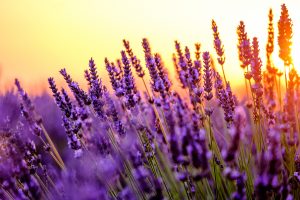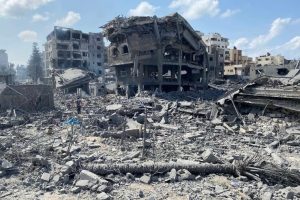Cryptocurrency is Deek’s last chance to succeed in life, and he will not stop, no matter what.
Previous Chapters: Part 1 | Part 2 | Part 3 | Part 4 | Part 5
“To say goodbye is to die a little.”
― Raymond Chandler, The Long Goodbye
“Down these mean streets a man must go who is not himself mean, who is neither tarnished nor afraid. He is the hero; he is everything. He must be a complete man and a common man and yet an unusual man. He must be, to use a rather weathered phrase, a man of honor—by instinct, by inevitability, without thought of it, and certainly without saying it.”
― Raymond Chandler, The Simple Art of Murder
A Happy Life
 Zaid Karim Al-Husayni sat on the sofa with his wife Safaa, talking quietly. It was a little after sunset, and it was raining hard. He held his wife close, his arm around her shoulders. She was warm, and her hair smelled of lavender drifting on the breeze across the rooftops of Baghdad as Arabic music played in the distance and the adhan sounded from a thousand masjids.
Zaid Karim Al-Husayni sat on the sofa with his wife Safaa, talking quietly. It was a little after sunset, and it was raining hard. He held his wife close, his arm around her shoulders. She was warm, and her hair smelled of lavender drifting on the breeze across the rooftops of Baghdad as Arabic music played in the distance and the adhan sounded from a thousand masjids.
Or at least that was how Zaid imagined it. Here in Fresno, California, all he heard was two cats fighting outside and a motorcycle accelerating in the distance. But these sounds were far away. Inside the apartment, all was hushed. It was a place of security and love – something he desperately needed after a rough day pursuing his chosen career as a private investigator.
Safaa’s phone, sitting on the kitchen table, rang quietly.
“Do you want to answer that?” Zaid asked.
“No.” She snuggled up against him, putting her arms around his neck. “I don’t want to move from this spot.”
From the bedroom came the sound of Hajar and Anna playing and laughing. It made Zaid smile. How wonderful that Hajar had an unexpected sister, and that Anna had found a happy life finally. Two years ago she had lost her father, been sold into slavery in Panama by her mother, and only through the most extreme effort and personal sacrifice had Zaid managed to rescue her. Now she was a member of the family.
What a blessing, what a barakah. SubhanAllah, alhamdulillah. He’d made good money on that Panama job, and had leveraged it to expand his P.I. business and buy two more mobile homes, but that paled next to the great blessing of having his family back together.
Safaa’s phone rang again. Zaid gave her a look that said maybe she should answer, but she shook her head stubbornly and let it go to voicemail.
Scars
Zaid and Safaa spoke of their love for each other, the mistakes they’d made in the past, and their plans for the future. Safaa reached up to his face and fingered the scar that ran from his hairline, across his right eyebrow to the bridge of his nose – a legacy from the torture he’d experienced in Panama.
“We could see a plastic surgeon about this,” she said, not for the first time. “There will always be a scar, but a good doctor could make it almost invisible.”
“Is it ugly?” Zaid knew the answer. He looked like a Bond villain or a prison escapee. When he met people their eyes shot to the scar, and he saw the signs of fear in their gazes.
“Ya Zaid Karim, ya habibi, nothing about you could ever be ugly. You’re as beautiful as Mars in the evening sky. You, to me, are the whisper of the wind, saying there is goodness and love in the world. But I know you’re self-conscious about it.”
Zaid smiled. “There you go with the poetry again. You’re stealing my thing. I’m supposed to be the lyricist.” Ever since he and Safaa had been reunited, she’d been so tender with him, so sweet. Even more than when they’d been newlyweds. It still amazed him that this was real, he wasn’t dreaming. This was the new Safaa, this was his life. SubhanAllah. Allah  worked in mysterious ways, but when you trusted Him with your whole self, holding nothing back, incredible things happened.
worked in mysterious ways, but when you trusted Him with your whole self, holding nothing back, incredible things happened.
“What about your scar, what do you want to do?” Zaid said, mostly just to tease her.
“What scar?”
He reached out and fingered the small, star-shaped scar on her forehead, just below the hairline. It was pale against her dark skin, though in reality you could barely see it unless you knew where to look. He knew she’d gotten it as a child, from scratching a particularly bad mosquito bite.
“Oh, you!” She smacked his arm.
Cousin Rania
Safaa’s phone rang a third time, and this time she let out an annoyed huff, strode to the kitchen and snatched the phone up, answering with, “Yes?”
Her face went from annoyance to concern. “Oh,” she said. “Oh my gosh. Yes, he’s right here.” She covered the phone’s speaker with her hand and mouthed, “It’s my cousin Rania. Deek has gone missing.”
Zaid took the phone. Rania sounded as if she’d been crying. Zaid listened with growing incredulity as Rania explained that Deek had supposedly made millions of dollars in cryptocurrency, bought a sports car on the spot, then packed his bags and vanished. He wasn’t answering his phone, and she was frightened and worried.
“I don’t care about the money,” Rania said. “I told him that I wanted the house and half the money, but I was just mad. I want him back. And if he won’t come back, I want to know that he’s safe. I’ll pay you.”
“Don’t be silly, you’re family. Anyway, from what I recall, Deek loses his temper but gets over it quickly. He’ll probably be back before you know it.”
“I’m scared.”
“I’m going to look for him. I need to know where he might go.”
“I don’t know!”
Safaa heard Rania’s raised voice coming through the phone and gestured to say, what’s going on? Zaid waved his hand to say, it’s fine.
“Take a deep breath,” Zaid said in a soothing tone, “then say la ilaha il-Allah.”
Rania did so, and Zaid had her do it twice more.
“I want you to think,” Zaid said. “You know him. Where would he go?”
“Right. Sorry. Maybe his sister’s house, but Lubna has a crowded home and little patience. And she doesn’t like Deek. Never has. Maybe his friend Marco, but they haven’t spoken lately.”
Zaid took both numbers, and called them. The sister had not heard from Deek, but the call to Marco hit paydirt. Deek was at the Moon Walk Motel.
Gun and Knife
 Five minutes later, wearing the battered brown fedora that had been a gift to him from his late mentor, Langston “Lonnie” Brown, Zaid opened the door to this car. The olive green 1969 Dodge Dart GTS was a performance-oriented, two-door hardtop sedan, with a V8 engine that could generate 330 horsepower. It was a true muscle car, and was Zaid’s most prized possession, after the fedora.
Five minutes later, wearing the battered brown fedora that had been a gift to him from his late mentor, Langston “Lonnie” Brown, Zaid opened the door to this car. The olive green 1969 Dodge Dart GTS was a performance-oriented, two-door hardtop sedan, with a V8 engine that could generate 330 horsepower. It was a true muscle car, and was Zaid’s most prized possession, after the fedora.
The car contained a hidden compartment known as a trap, built into the space where the CD player would normally go. To activate it, you had to close all the doors, be seated in the driver’s seat, start the car, activate the rear defroster, then swipe a credit-card sized magnet across the top of the dashboard. Zaid did all this, and the trap popped open. Inside it was a thousand dollars in cash, and his gun, a Glock 49.
He didn’t always carry the gun on his person, but years of P.I. work had given him an instinct for when the path ahead was dipping into danger. Or maybe it was just his PTSD at work. In any case, he removed the firearm from the trap, and holstered it. At only 7.3 inches in length, the Glock 49 was one of the most compact 9 millimeter pistols one could buy, yet reliable and a good shooter. Zaid found it unobtrusive and easy to carry.
He headed west. Aside from the gun, he had a pair of four inch Cold Steel folding knives clipped to his front pockets. They were assisted openers, meaning they would spring open with just a touch of pressure from his thumb. He never went anywhere without at least one knife – a habit that had saved his life more than once.
A Step Back
He was aware that he was not the same man he’d been before Panama. His body had healed and become stronger than ever, but his heart was still brittle and sore. This soreness manifested itself not as an inclination to break, but as a quickness to violence in marginal situations. Where in the past he might have been willing to walk away or negotiate, now he had little tolerance for evil, and worried less about consequences.
This was not only the result of the trauma he’d experienced in Panama. Two years ago his Uncle Haidar’s apartment building in northern Gaza had been bombed without warning by the Israelis. Haider was Zaid’s father’s younger brother, the youngest sibling. He and his wife and four children had lived in Gaza City. The youngest child at the time was a baby named Munir, only a month old.
 The apartment building was shattered. Over thirty people were killed. Uncle Haidar was killed, along with three of the four children. Haidar’s wife Faiza survived. The baby, Munir, was hit by a shell fragment while Faiza was nursing him. It entered the top of his head and went out the other side.
The apartment building was shattered. Over thirty people were killed. Uncle Haidar was killed, along with three of the four children. Haidar’s wife Faiza survived. The baby, Munir, was hit by a shell fragment while Faiza was nursing him. It entered the top of his head and went out the other side.
Now, two years later, Aunt Faiza and Munir were in Jordan. Munir could not speak or walk. Periodically he lapsed into seizures. Zaid had seen this with his own eyes, while talking to Aunt Faiza on Skype. Whenever it happened Zaid managed to hold himself together just long enough to get through the call, after which he would hold his face in his hands and weep as Safaa held and comforted him.
These events – the torture in Panama, and the murder and maiming of his relatives – had affected him on a deep level. There was a hardness in him now. An unwillingness to bend or compromise. He felt like he’d taken a big step back.
He knew this was not good. Before Panama he’d been working on his internal state, trying to achieve a more peaceful way of being, and to eliminate the thought patterns he’d acquired during his six years in prison. But it was difficult to reconcile a desire for a peaceful existence with what he’d experienced in Panama, and with what had happened to his Palestinian people – and was still happening. How did one commemorate, mourn or even deal with a Nakba that never ended?
A Simple Job
The rain had abated but the streets were wet, shiny and nearly deserted. As Zaid drove, his eyes moved constantly from the road ahead, to the rear view mirror, to the side mirrors. Even when he didn’t do it consciously, part of his mind recorded every car that passed or followed him, just as his mentor Lonnie Brown had taught him. Was anyone surveilling or following him? Did anyone display undue interest? Was anyone driving erratically or behaving suspiciously?
 Zaid wasn’t surprised to hear that Deek had made a fortune in crypto. The man had always been intelligent and determined. Zaid only hoped that Deek had not gotten himself into trouble. Money could do strange things to a person. This seemed like a simple job – find Deek and bring him home – but the streets of Fresno were never to be underestimated, and Zaid knew from experience that what he imagined might happen and what actually would happen were sometimes very different things.
Zaid wasn’t surprised to hear that Deek had made a fortune in crypto. The man had always been intelligent and determined. Zaid only hoped that Deek had not gotten himself into trouble. Money could do strange things to a person. This seemed like a simple job – find Deek and bring him home – but the streets of Fresno were never to be underestimated, and Zaid knew from experience that what he imagined might happen and what actually would happen were sometimes very different things.
All Zaid knew for sure is that success in any venture could not be had without guidance from Al-Hadi, the One Who Guides. You could scour this world down to its bones, but sometimes the answers were simply not there. Illumination came from on high, and was given to all – the sun shines for all, as his Panamanian friend Niko used to say – but not everyone opened their eyes to it. The other thing Zaid knew was that if you followed the guidance that came from Allah – not only the literal guidance of the Quran, but the secret guidance imprinted on your own heart – then you were already a success, no matter what might manifest on this earthly realm.
This was something he’d tried to tell Deek a few years ago, when the big man had been at a low point in his cryptocurrency odyssey and had spoken to Zaid confidentially about suicidal thoughts he was experiencing. But Deek was an “I” kind of guy. I can do it, I cannot do it, I failed, I succeeded. I, I, I.
Zaid’s advice about submitting the “I” to the “He” – the personal to the Eternal – had fallen flat. Ever since that conversation he’d worried about Deek. Now that the man had apparently succeeded with the cryptos, Zaid found that his worry had not diminished.
Room 9
Still lying on his back in the concave, drooping bed, Deek gazed at the ceiling. He couldn’t remember the last time he’d felt so alone. He’d been separated from his family before, but this time felt more decisive, as if the bridge had been blown up behind him. Nor was he Tariq bin Ziyad, burning the ships behind him so that his army would have no choice but to conquer Spain. No, it was more like he was an allied spy in Nazi territory, and had dynamited the bridge that would enable him to escape back to his own people.
As always when he and Rania fought, it was hard to tell who was at fault. But he thought that this time it was more her than him. It used to be that he pushed her buttons and she got mad, then he became hurt and angry in turn. But lately it seemed that Deek himself was one big button. Everything about him bothered her.
If he’d failed with the cryptos that would have been one thing. She could have said that the last five years were a waste, that Deek was a failure and she was tired of carrying him. He wouldn’t have liked it, but he wouldn’t have been able to respond beyond continued pleas for her to hang in there a little longer.
But he hadn’t failed, he had succeeded! He’d done it! He’d pulled off the reversal of a lifetime. Yet here he still was, alone. He thought about this “work husband” of Rania’s. If he knew the man’s identity he would drug him, kidnap him, and dump his body in the San Joaquin River. Maybe he could hire Zaid Karim to find out the man’s identity. But no, Zaid would not take such a job. He was yet another man of principle and integrity. Deek snorted at this thought. Having principles just meant you were afraid to do the things that truly needed to be done.
As he often did when he was bored, he decided he was hungry. There had to be a 7-11 nearby. He’d make a food run and grab a pre-made tuna sandwich, a bag of chips and a soda.
The Man With The Plan

Manuel “Manny” Cesar, accompanied by three vatos whose loyalty and viciousness he trusted, eased the van into the parking lot of the Moon Walk, and looked around.
“Ojo, there’s the Porsche 911, pretty as a gun, son. Time to have fun.”
Oscar, a tall man with a gently rounded belly, slicked back hair and puppy dog eyes, laughed. “There he goes, rhyming again. Get your mind on the job, esse.”
Manny turned to glare at the big man. “You got a doubt I can knock it out?” The glare was for form’s sake. He knew Oscar could fight like a rhinoceros when needed.
Oscar waved his hands in surrender. “No, jefe. I was kidding. I know you’re the man with the plan. ‘Cept you brought us to the wrong place, fool. This is the Moon hotel, not the Moon Walk.”
“Don’t be stupid, esse,” Manny said with irritation. “The sign is burned out, that’s all. There’s the pendejo’s Porsche, right there. You think anybody else gonna park that bombshell at this mo-tel? You got the brains of a sperm cell.”
Oscar didn’t like that and sat back sullen-faced. He shoulder bumped the man next to him, a hard-as-cement, heavily tattooed killer named Poison. “Watchu say?” Oscar demanded. “We at the Moon hotel or the Moon Walk?”
Poison said nothing. He rarely spoke, a fact that Manny appreciated.
The last of their group was the kid, a teenager with good hands and fast reflexes, whose only job was to drive the Porsche back to Mr. Z.
The Porsche was parked in front of room number nine, that was fine. He would need to find out for sure what room the car thief was in, and even then he wasn’t crazy about the idea of breaking down a motel door. The FPD, or more likely the county sheriffs, would be here in ten minutes. Didn’t need cops barging in like triceratops.
Better to lure this Deek hombre out of the room somehow, snatch him up and take him to a private location where he could be beaten into the ground, nobody around to hear the sound. Meanwhile one of his men could take the car back to Mr. Tzan’ani, or Mr Z as his employees called him.
When Mr. Z sent Manny out for side work, it was usually just burning down rival shops, pressuring liquor distributors for a better price, or intimidating non-Yemeni shop owners into selling. The price of doing business, no room for forgiveness. Mr. Z was Father Christmas, making money with a quickness.
Now and then it was something personal. Beat up an American boy trying to date one of the Yemeni girls. Escort one of Mr. Z’s cousins or nephews to rehab and made sure he stayed.
It was fascinating how much like Mexicans these Yemenis were. They even carried the same prayer beads. Like Mexicans from the other side, same faces, same pride. Manny was comfortable working for them. And Mr. Z paid well – that was the key. That sweet cha-ching. A pile of dinero to make him a pharaoh, a rich vaquero, putting himself primero. For that, there was nothing that Manny would not do, up to and including cold-blooded murder.
***
[Part 7 will be published next week inshaAllah]
Reader comments and constructive criticism are important to me, so please comment!
See the Story Index for Wael Abdelgawad’s other stories on this website.

Wael Abdelgawad’s novels – including Pieces of a Dream, The Repeaters and Zaid Karim Private Investigator – are available in ebook and print form on his author page at Amazon.com.
Related:
Hot Air: An Eid Story [Part 1]
A Ramadan Quran Journal: A MuslimMatters Series – [Juz 10] The Covenant
The post Moonshot [Part 6] – Down These Mean Streets appeared first on MuslimMatters.org.

 tells us in the Quran:
tells us in the Quran:

 narrated that the Prophet ﷺ said: “While a man was in a barren tract of land, he heard a voice in a cloud saying: ‘Irrigate the garden of so-and-so.’ The cloud moved and poured its water over a rocky area. The water collected in a channel, so the man followed it and found a person standing in his garden, directing the water with his shovel. He asked him: ‘O servant of Allah, what is your name?’ He said the name that was heard from the cloud. He then asked: ‘Why do you ask about my name?’ He replied: ‘I heard a voice in the cloud which poured this water, saying: “Irrigate the garden of so-and-so,” mentioning your name. What do you do with it?’ He said: ‘Now that you have asked, I look at what it produces and give one-third in charity, my family and I eat one-third, and I reinvest one-third back into the garden.'” [
narrated that the Prophet ﷺ said: “While a man was in a barren tract of land, he heard a voice in a cloud saying: ‘Irrigate the garden of so-and-so.’ The cloud moved and poured its water over a rocky area. The water collected in a channel, so the man followed it and found a person standing in his garden, directing the water with his shovel. He asked him: ‘O servant of Allah, what is your name?’ He said the name that was heard from the cloud. He then asked: ‘Why do you ask about my name?’ He replied: ‘I heard a voice in the cloud which poured this water, saying: “Irrigate the garden of so-and-so,” mentioning your name. What do you do with it?’ He said: ‘Now that you have asked, I look at what it produces and give one-third in charity, my family and I eat one-third, and I reinvest one-third back into the garden.'” [



